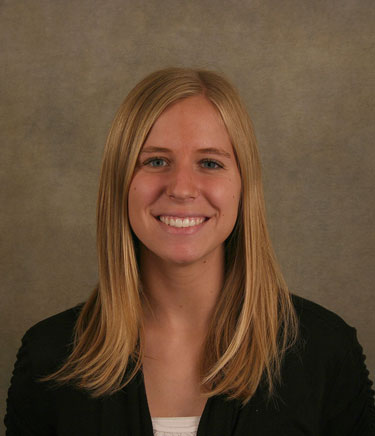After graduating with a master’s degree in social work from the University of Iowa, Sarah Berte-Greinert (15BA 17MSW) decided against a big bustling city; instead she stuck close to home to help those in need.
As a social worker in the tiny northwest Iowa town of Gruver, Greinert counsels teenage girls who have been subject to physical, emotional, or sexual trauma.

“The need for mental health professionals in rural Iowa is so desperate,” she says. “I felt like that was my way of giving back. It was one of the very few jobs in the area because there are so few mental health services around here.”
Greinert typically uses techniques like trauma focused cognitive behavioral therapy and eye movement desensitization processing to help her patients heal from their troubled pasts.
“My work is challenging yet rewarding, because there are days that seem to linger. It’s a struggle and you’re trying to do your best to help them,” Greinert says. “A lot of the time it just comes back to understanding their past and how it impacts their thinking.”
Counseling the girls also takes a lot of patience, but the result is what makes the hard work worth the effort, according to Greinert.
“The moment you can see that they get it is the best part about it,” she says. “They start to make different choices, which can lead to better opportunities.”
For one of her cases, Greinert worked with a girl by using a genogram; a family tree that tracks various hereditary and relationship patterns within families. After identifying what she knew about her older relatives, the girl had a breakthrough.
“The words she told me were, ‘wow, I guess I never really understood that this wasn’t all my fault,” Greinert says. “It was this moment where it clicked for her. All these things that happened to her all those years ago really have impacted her now and she had no control over that.”
While pursuing her master’s, Dean John Keller helped Greinert by being her mentor and giving her feedback.
“She was an excellent student and we knew she’d do great things,” Keller says. “We are so proud that she has decided to return to northern Iowa to care for young girls in crisis. She’s a positive role model for her patients and social work students—and for all of us, really.”
Greinert says that research and higher education gave her great tools for her job, but she’s also constantly thinking of and assessing client’s backgrounds to help positively impact on their well-being.
“As a social worker, I have a responsibility to my clients to hold space, be present in the sharing of their life experiences, and work with them so that they can become change agents in their life,” she says.